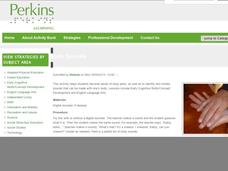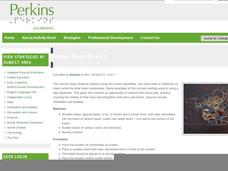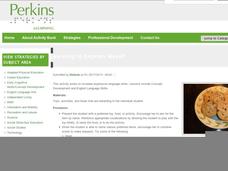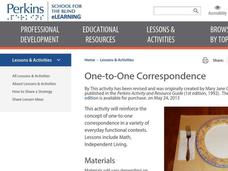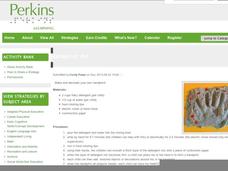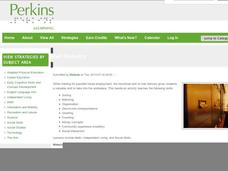Perkins School for the Blind
Familiar Sounds
To foster concept development and auditory discrimination skills, learners with visual impairments listen to identify a variety of common sounds. The teacher makes recordings of various sounds, including those found in the home, at the...
Perkins School for the Blind
Grocery Shopping
Grab those reusable bags, it's time to go shopping! Intended to foster independent living skills in learners with visual impairments, the lesson covers several topics related to grocery shopping. They start by planning a meal, reading...
Perkins School for the Blind
The Country Egg
Because most children with visual impairments don't reach and grab things at a young age the way sighted children do, they need additional supports to build up their fine motor skills. Here, they work on the pincer grasp, using their...
Perkins School for the Blind
Learning to Identify Sounds Made by the Body
Sneeze, snap, tap, and whistle; Did I do that? Explore the parts and sounds of the human body with your learners with visual impairments. First you'll name the parts of the body, make a sound with each part, and then have the class...
Perkins School for the Blind
Rubber Band Stretch
If you don't teach blind or visually impaired students, this instructional activity may seem a bit strange. But, it helps them develop motor skills, orientation and movement skills, and listening skills, while building a better...
Perkins School for the Blind
Safety Skills
Learning how to stay safe in a dangerous situation is of utmost importance, especially when you have a visual impairment or special need. The teacher makes up a set of dangerous scenario cards based on the provided set of guiding...
Perkins School for the Blind
Left Versus Right
When you can't see, it is extremely important to be able to reorient yourself. Learners with visual impairments work though an activity to build spacial awareness based on moving left and right. A marker (bracelet, bell, or weight) is...
Perkins School for the Blind
Learning to Express Myself
Expressing one's wants and needs is vital for learners of any age or ability level. Young children with visual impairments and intellectual disabilities practice asking for preferred items, foods, or activities in a structured manner....
Perkins School for the Blind
Put the Shoe on Your Foot
Promote clothing identification, body part identification, and dressing skills acquisition with a fun and lively game. Each child takes turns grabbing a clothing item from the central clothing box. As he puts the item on, he sings,...
Perkins School for the Blind
One-to-One Correspondence
Here is an interesting way to build concept understanding regarding one-to-one correspondence. Learners with visual impairments will use an array of everyday objects in context to foster an understanding of what one-to-one correspondence...
Perkins School for the Blind
Rolling Along
I cannot stress enough how important orientation and mobility training is for learners with visual impairments. To practice maintaining their balance, as well as work on building the confidence to participate in recreational sports,...
Perkins School for the Blind
Treasure Hunt
On, over, and under are some very common prepositions; but how can you teach these concepts to children with visual impairments? Here, is one way. Kids will practice following verbal commands as they go on a classroom treasure hunt. They...
Perkins School for the Blind
Handprint Art
Stimulate the senses with a handprint art project! Flake laundry detergent, water, and food coloring are mixed together to create a substance that has a pleasant smell and will dry hard and dimensional. Children with visual disabilities...
Perkins School for the Blind
Conservation of Mass
How do you teach a student with visual impairments about the conservation of mass? You use tactile models that represent the theoretical concept. Baking soda and vinegar are used to add gas to a deflated balloon. Learners will feel the...
Curated OER
Fire Safety Skills
Here is a fire safety instructional activity specifically designed for blind or visually impaired teens. They will attempt to exit the building safely, feeling for hot spots, heat drafts, and obstacles. A hairdryer, tape recorded fire...
Curated OER
ASL Lesson 18
Have a discussion, review nouns, and practice speaking using ASL. Lesson 18 of 30+ extensive lessons on using American Sign Language covers classifiers, coded English, and asking questions. Each link embedded in the lesson plan provides...
Perkins School for the Blind
Mail Delivery
Teaching job skills to your learners with special needs before they enter the workforce is a great way to ensure that they will gain employment. For this lesson, your young scholars will become the school's very own mail or delivery...
Perkins School for the Blind
Human Body Regulation
The human body can regulate itself through sweating and resting. Learners with visual impairments discuss how the body changes when it is under stress and what it does to regulate itself. To start, kids use talking thermometers to take...
Nazareth College
Chronological Order
First, next, and last, the elements of chronological order. In every story or text one can find a series of events that occur one after the other. To help learners with visual impairments conceptualize chronological order, this...
Perkins School for the Blind
High Stepping
Learners who are blind or have visual impairments learn to take high steps in order to improve their balance and mobility. They start by marching in place, and then march around the room. Finally, they attempt to step over a towel as...
Perkins School for the Blind
The Function of Villi in the Small Intestine
Ever wonder what the villi in the small intestine do? I bet your class would love to find out. Mesh netting is used to represent small blood vessels on the outside of the intestine, and a chenille bath mat is used to represent the villi...
Perkins School for the Blind
Tactile quilts that tell a story
Learners with multiple disabilities need to engage in projects that push them to know their full potential. They need to be able to express themselves in a variety of ways, and this very thoughtful lesson does just that. They make a...
Perkins School for the Blind
Integrated Skills - Laundry
I hate doing laundry, even if it is an independent living skill that requires me to count money, follow a sequence, and sort clothing by color. Learners with multiple disabilities discuss what laundry is, why they need to do it, and how...
Perkins School for the Blind
Accessible Labels
When you're blind it is extremely important to be able to navigate your environment in as independent a way as possible. This idea isn't a lesson, but it is a great way to foster independent mobility and literacy skills while making the...





